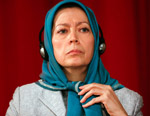
On Wednesday, National Council of Resistance of Iran President Maryam Rajavi appeared via videoconference before the House Foreign Affairs Subcommittee on Terrorism, Nonproliferation and Trade, where she used a hearing titled “ISIS: Defining the Enemy” in order to recommend a different approach to the issue of Islamic fundamentalism, which would include overturning the theocratic regime in Tehran.
Rajavi repeatedly referred to that regime as the “epicenter of fundamentalism” in the Middle East, emphasizing that the constitution of the Islamic Republic and the writing of its founder both call for exportation of the Islamic revolution and the absolute authority of a caliph at the center of the Muslim world.
In her written testimony submitted to the subcommittee, Rajavi said that the repressive Sharia law practiced by the Iranian regime “is precisely the example, which both Sunni and Shiite extremists are following in other countries.”
Rajavi also warned of “destructive consequences” for the lack of a firm Western policy aimed at uprooting this example. Her testimony left no doubt that the NCRI thus believes the stated policy of the West should be regime change in Iran.
This is not to say that her testimony called for direct American military intervention to bring about that regime change. Indeed, the NCRI’s public statements are consistently positive about the prospect for indigenous regime change brought about by a popular resistance inside of Iran, suggesting that what is needed from the international community is only the isolation of the regime and its containment to within its borders.
Rajavi’s testimony also called upon Western policymakers to show political and moral support for the NCRI and its principal constituent group the People’s Mojahedin Organization of Iran (MEK), which has made headlines at various times since 2002 for revealing details of the Iranian nuclear program through an intelligence network inside of Iran.
Many congressmen on both sides of the aisle, as well as other current and former US officials welcomed Rajavi’s testimony on the basis of this role played by her organization. Prior to her testimony about two dozen former senior US officials said in a joint statement: “As a Muslim woman advocating a tolerant and democratic interpretation of Islam, individual freedom, separation of religion and state, gender equality, and rejecting the implementation of Sharia law, Mrs. Rajavi represents the opposite of the misogynistic Iranian regime’s rulers and all Islamic fundamentalists and extremists.”
During the hearing Rajavi added that the Iranian resistance embodies a broader movement of moderate, pro-democratic Islam that should be embraced as an ally by Western governments for the sake of combating Islamic fundamentalism as a whole, instead of tending to focus on one side of what Rajavi called the “artificial dichotomy” of Sunni and Shiite extremism.
“Owing to the pivotal role of the People’s Mojahedin Organization of Iran as a democratic Muslim movement, the Iranian Resistance has established itself as the antithesis to Islamic fundamentalism,” Rajavi declared.
Again rejecting any policy that leverages one extremist group against another, Rajavi told the House subcommittee, “We can and we must defeat Islamic fundamentalism, whether Shiite or Sunni.” She went on to outline several practical steps that Western governments might take toward this end, one of which was to “recognize the Iranian people’s aspirations to overthrow the mullahs.”
Rajavi pointed to regime change in Iran as a prerequisite to rooting out Shiite fundamentalism there, and thus to the defeat of other forms of Islamic fundamentalism on the global stage.


